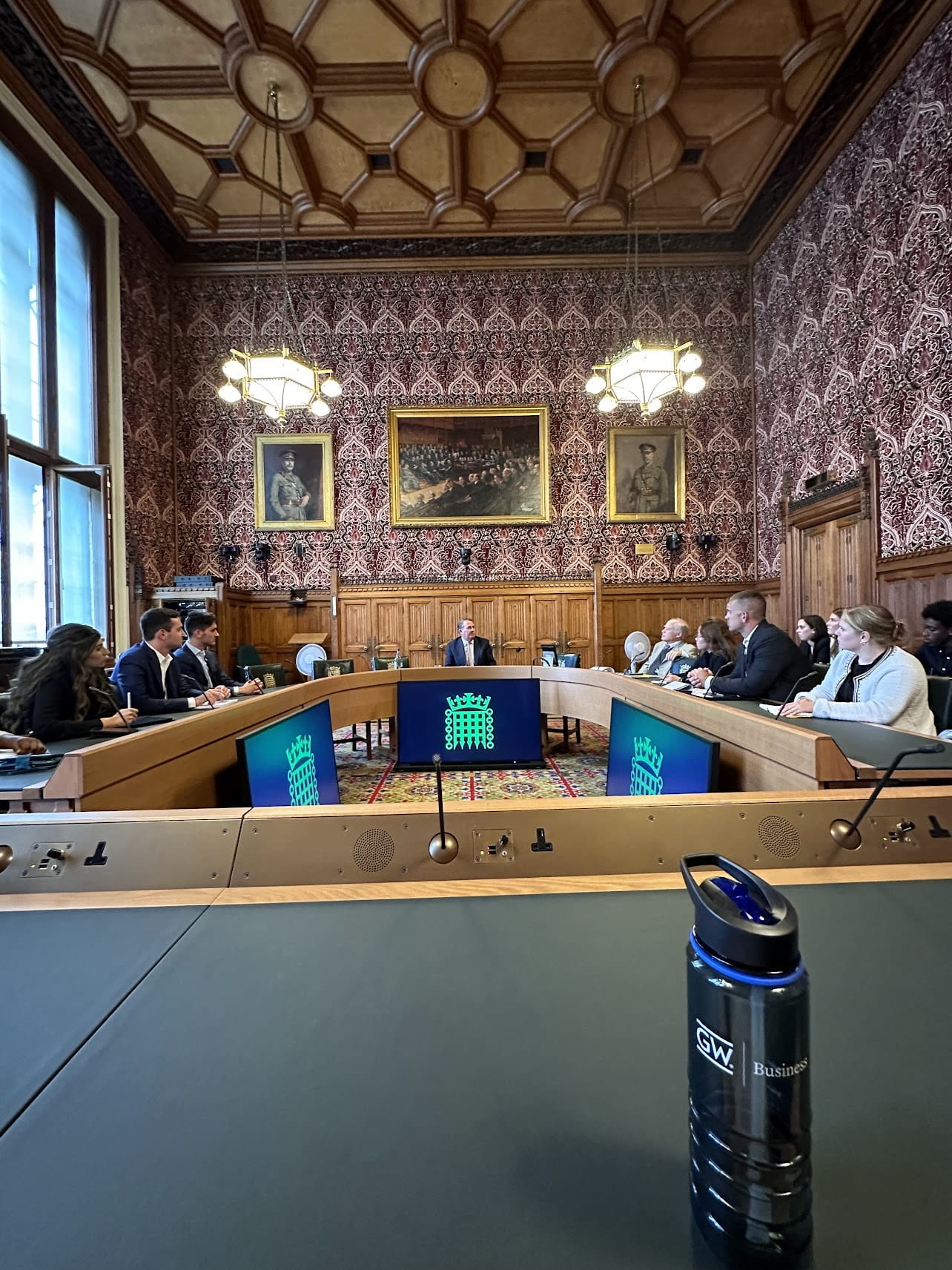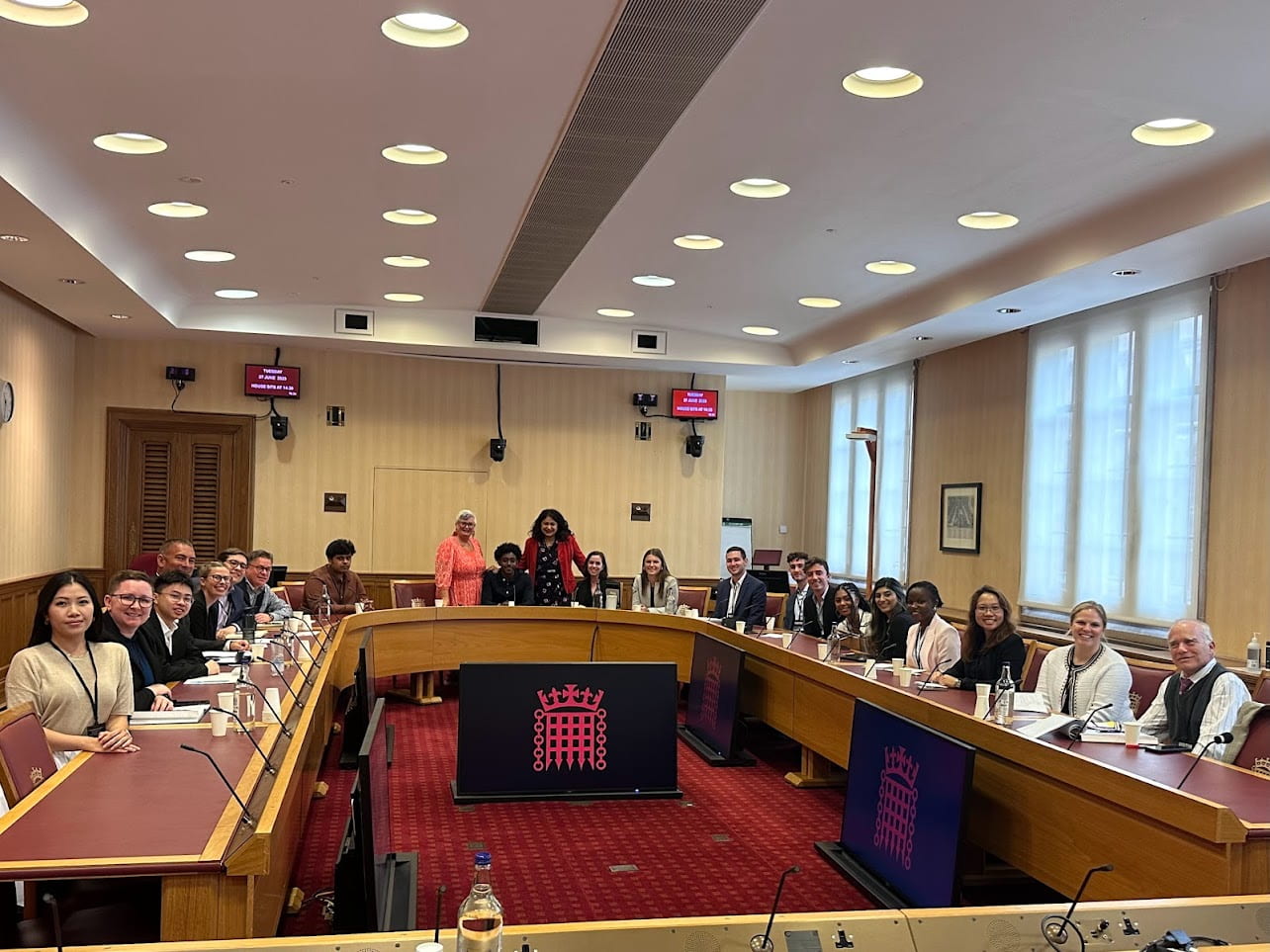Featured in the above photo: STAP UK participants at the Houses of Parliament.
By Sydney Smith (MAccy '23)
Washington is a city full of recovering idealists- we strive to find common ground and a sense of pride while seeking change in our country and local communities. The reality of political showmanship and involvement of lobbying by private enterprise can be frustrating. As business and policy students, we are not immune to this spreading pessimism. In our classrooms and papers, we grapple with a gnawing sense of dread, questioning whether our nation is capable of marching towards progress. The challenges our generation faces- growing wealth inequality; rampant misinformation; unequal access to education, housing, and healthcare; and the impending threat of climate catastrophe- seem insurmountable. It's hard to fathom how our “large tent” democracy, with its wide-ranging political viewpoints and philosophies, can confront these existential issues in a unified front. The challenges that we face are formidable and frankly petrifying, even if our nation was less divided.
I know this firsthand, as I am one of those former idealists. I’ve always been interested in the intersection between policy, politics, and profit. In my undergraduate research, I wrote a capstone paper on the economic incentives of pharmaceutical patent length and its remarkable ability to stoke innovation within the industry. At the time, I was wholly under the impression that market flaws and externalities could be corrected with the right blend of government regulation and industry compliance. When I first moved to D.C., I brought this optimistic philosophy with me. Over four years in this city, I became pessimistic about our government’s inability to legislate and move through social challenges within a radically divided nation.

The author in Winchester, ancient capital of England.
This is why I was initially drawn to the Business and the State study-abroad program offered by GWSB: I was hoping to better understand regulatory mechanisms that harness the power of private industry’s innovation. Instead, my takeaways are more interpersonal than technical- I was particularly transformed by our speakers’ optimism, community pride, iterative legislative philosophy, and collaborative spirit.
Key Takeaway: Gaining Appreciation for NHS & National Pride
One of the most profound surprises during the program was the unwavering optimism radiating from the speakers we encountered. It challenged my own pessimistic perspective and instilled a renewed sense of hope. Throughout the course, the National Health Service (NHS) became a symbol of wide public support and collaboration. As our first speaker in D.C., Tom Haigh cautiously discussed the challenge of increasing NHS wait times for specialists. I found the contrast between his sanitized presentation and Sonia Klein's candor quite interesting. As a civil servant and embassy representative, Mr. Haigh stayed on message: the NHS struggled during the pandemic, but the government was acting quickly to accelerate access. Meanwhile, Sonia Klein was more willing to chime in and challenge our presumptions about British healthcare- and regularly pushed back against in-class criticisms on doctor pay and innovation of the NHS. Both Mr. Haigh and Ms. Klein were effusive in their support and pride in centralized healthcare.

The unwavering national pride in the NHS stood in sharp contrast to contentious debates over healthcare in the US. The guest speakers celebrated the system's merits despite its flaws. Their philosophy of healthcare as a basic right for all citizens was striking. It became apparent that the NHS symbolizes core national values of equality and community. While private interests certainly play a small role in its functioning, the spirit of public good prevails. The NHS represents a shared ideal that all deserve quality care regardless of economic status. This clear national consensus does not exist in America's fractured healthcare system.
Surprises: Broad Support on Climate Change
Beyond healthcare, I encountered unexpected and encouraging perspectives on climate change that further impressed me. While Dr. Liam Fox MP has a reputation for “right-wing” Tory ideals, he discussed climate change not just as a legitimate driver of global social strife, but also highlighted the urgent issue of water rights. Although I understand UK political parties differ from the US, I was relieved that the science of climate change seems to be widely accepted rather than maligned in Parliament. Fox's forward-looking views defied my expectations; they showcased the potential for, and urgent need of, bipartisan cooperation in addressing environmental concerns in the US. Similarly, Richard Threlfall of KPMG passionately endorsed global innovative efforts to combat climate change. Most inspiring to me was his commentary on the need for wealthy countries to contribute to a global fund supporting struggling island nations during the climate crisis - this willingness to subvert traditional capitalist ideals renewed my faith in business leaders prioritizing global well-being over profiteering.
Having studied the partisan divide over climate change policies in the US, I expected to hear similar skepticism within the UK's Conservative party and from business leaders. Yet MP Liam Fox and business leader Richard Threlfall both urgently emphasized the need for climate action, contrasting sharply with denialism from American conservatives. His science-based perspectives surprised me given right-wing and efficiency-focused ideological opposition to environmental regulations in the US; climate policy has not become as politically polarized in the UK as it has across the Atlantic. Discussing climate change as an imminent threat requiring global collaboration rather than a contested scientific theory suggested potential for consensus-driven policymaking.

Incremental Change Through Trial and Error: Lessons on Flexible Policymaking
The program not only revealed surprising viewpoints but also highlighted the power of incremental progress throughout the years—a notion that resonated deeply with me. Labour MP, Carolyn Harris described her efforts to spread awareness of and regulate the pernicious gambling industry as a piece-meal process. MP Harris sought to decrease the harm of gambling first, by decreasing the cost of each bet; in response, the gambling industry shifted toward online gambling- which conveniently fell outside of the current law. Legislators must be willing to try one model of regulation and then shift with the changing tides of private industry. Our speaker at Cambridge, Professor David Newbery discussed the challenges of getting regulatory structure correct for privatized electricity in the U.K.- this took three separate frameworks before striking a moderate balance between the power of the regulators and the electric companies. Professor Newberry did not seem to dwell on the fact that the regulation was not perfect, instead he focused on the incremental improvements overtime. This was an excellent real-world example of “not letting perfect get in the way of good enough.”

The nuanced perspectives on evolving regulations resonated with me as a pragmatist at heart. More than lofty ideologies, it takes reasonable compromises and dedication over time to truly improve society. MP Harris' journey regulating gambling and Professor Newbery's analysis of iterative electricity frameworks demonstrated that progress emerges slowly through trial and error.
Rather than work backwards from theoretical or academic perfection, policymakers must craft practical solutions first and refine them as needs and scenarios shift. I gained appreciation for this flexible, incremental approach from UK leaders across sectors. Their lived experiences revealed how even flawed policies can move towards better alignment through dedication to the bigger picture.
This course provided invaluable insight into the interplay between government, business, and social institutions in the UK. The passion speakers conveyed about quintessentially British programs like the NHS demonstrated deep national pride and a willingness to bring in unexpected viewpoints. I gained appreciation for how policy change can occur incrementally over years through coalition-building. While theory is important- I’ve always found praxis to be far more enlightening, especially within the context of experiential learning.

The author at the British Army Logistic Corps Museum, Winchester.
I look forward to applying the nuanced understanding of public-private partnerships I developed to my future career in public service. I am grateful for the inspiring examples of collaboration, persistence, and pragmatic optimism this course provided. It was a rare intellectual treat for me to speak to so many fascinating and intelligent people- and still leave the conversations full of hope.


